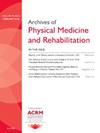身体残疾儿童照顾者自我同情弹性习惯课程
IF 3.6
2区 医学
Q1 REHABILITATION
Archives of physical medicine and rehabilitation
Pub Date : 2025-05-01
DOI:10.1016/j.apmr.2025.03.013
引用次数: 0
摘要
中度至重度身体残疾儿童(如脑瘫、脊柱裂、创伤性脑损伤、遗传性疾病)的照料者报告说,他们有高度的压力、倦怠、孤立和自责(Dlamini et al., 2023;Masefield et al., 2020)。基于自我同情的干预措施与改善心理健康有关,适合解决长期照顾者常见的孤立、自我贬低和自我批评倾向(Neff, 2023)。然而,这些干预措施尚未在身体残疾儿童的照料者中进行测试。根据服务提供者、倡导者和护理人员咨询小组的反馈,我们开发了一个6节(每节1.5小时)的在线小组护理人员弹性习惯课程。通过专科诊所或社区组织的传单招募了8名护理人员(100%女性,法师= 44,38%黑人,62%白人)。护理人员参与了关于5个关键的基于自我同情的弹性习惯的练习、讨论和实践:(1)正念(注意思想、感受和感觉);(2)共同的人性(承认困难的情绪是有意义的,并将我们联系在一起);(3)自我仁慈(提供温和而强大的内在支持);(4)有帮助的行动(采取措施满足需求);(5)沉浸在美好之中(欣赏/注意到美好)。在干预前和干预后进行在线问卷调查,并对小组反馈进行录音、转录,并使用反身性主题分析进行分析。出勤率和可接受性都很高,6/8的人参加了每次会议,7/8的人强烈同意或同意他们会向其他护理人员推荐该课程。干预前后,平均弹性和自我同情增加,平均焦虑、抑郁、感知压力、情绪调节困难减少。定性主题显示了看护者的情感意识、孤立感、优雅和自我倡导能力的转变。照顾者表达了对未来由照顾者同伴共同促进和继续参与的机会的兴趣。弹性习惯课程显示了作为护理人员获得技能以培养更大福祉的可访问的,可接受的资源的承诺。今后的工作应检查功效、效果和执行情况。本文章由计算机程序翻译,如有差异,请以英文原文为准。
Self-Compassion-Based Resilience Habits Course for Caregivers of Children with Physical Disabilities
Caregivers of children with moderate to severe physical disabilities (e.g., cerebral palsy, spina bifida, traumatic brain injuries, genetic conditions) report high levels of stress, burnout, isolation, and self-blame (Dlamini et al., 2023; Masefield et al., 2020). Self-compassion-based interventions are linked to improved mental health and are suited to address isolation, de-prioritization of self, and self-critical tendencies common to long-term caregivers (Neff, 2023). However, these interventions have not been tested in caregivers of children with physical disabilities. Informed by feedback from service providers, advocates, and a caregiver advisory group, we developed a 6-session (1.5 hour/session) live-online group Resilience Habits for Caregivers course. Eight caregivers (100% female, Mage= 44, 38% Black, 62% White) were recruited via flyers in specialty clinics or community organizations. Caregivers participated in exercises, discussions and practices around 5 key self-compassion-based resilience habits: (1) Mindfulness (noticing thoughts, feelings and sensations); (2) Common Humanity (acknowledging that difficult emotions make sense and connect us); (3) Self-Kindness (providing gentle and strong internal support); (4) Helpful Actions (taking steps to meet needs); and (5) Soaking in the Good (appreciating/noticing good). Online questionnaires were administered pre and post intervention and a group feedback session was audio recorded, transcribed, and analyzed using reflexive thematic analysis. Attendance and acceptability were high, with 6/8 attending every session and 7/8 strongly agreeing or agreeing that they would recommend the course to other caregivers. Mean resilience and self-compassion increased, while mean anxiety, depression, perceived stress, difficulties with emotion regulation decreased pre versus post intervention. Qualitative themes showed shifts in caregivers’ emotional awareness, sense of isolation, and capacity for grace and self-advocacy. Caregivers expressed interest in future co-facilitation by caregiving peers and continued opportunities for involvement. The resilience habits course shows promise as an accessible, acceptable resource for caregivers to gain skills to cultivate greater well-being. Future work should examine efficacy, effectiveness, and implementation.
求助全文
通过发布文献求助,成功后即可免费获取论文全文。
去求助
来源期刊
CiteScore
6.20
自引率
4.70%
发文量
495
审稿时长
38 days
期刊介绍:
The Archives of Physical Medicine and Rehabilitation publishes original, peer-reviewed research and clinical reports on important trends and developments in physical medicine and rehabilitation and related fields. This international journal brings researchers and clinicians authoritative information on the therapeutic utilization of physical, behavioral and pharmaceutical agents in providing comprehensive care for individuals with chronic illness and disabilities.
Archives began publication in 1920, publishes monthly, and is the official journal of the American Congress of Rehabilitation Medicine. Its papers are cited more often than any other rehabilitation journal.

 求助内容:
求助内容: 应助结果提醒方式:
应助结果提醒方式:


